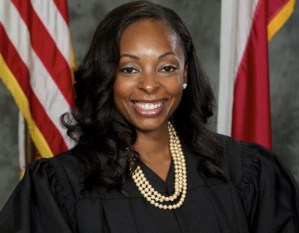By Deborah Bailey,
AFRO Contributing Editor,
dbailey@afro.com
Claudine Gay, the 30th President of Harvard University, knew months ago that the Supreme Court would render a decision on Students for Fair Admissions v. President and Fellows of Harvard College close to the end of the term in late June.
Gay quickly realized that a good deal of her early days in the role would be spent clarifying what the Supreme Court ruling on affirmative action would mean for Harvard University going forward.
So, at the start of her presidency– which officially began on July 2– the cool, analytical political scientist and first Black chief administrator of the nation’s oldest university, spoke directly to the Harvard community. Gay addressed Harvard and all who care about moving forward with the mission of education in the face of continuing racial discrimination, with the measured, practical manner that has been her trademark since arriving to teach government in 2006.
“The Supreme Court’s decision on college and university admissions will change how we pursue the educational benefits of diversity,” Gay in a response to the ruling, live streamed on Youtube.
“But our commitment to that work remains steadfast. It is essential to who we are and the mission we are here to advance. We will comply with the Court’s decision, but it does not change our values. We continue to believe deeply that a thriving, diverse intellectual community is essential to shaping the next generation of leaders.”
The Coalition for A Diverse Harvard, a group in existence since 2016, has assembled a broad and diverse membership of close to a thousand current students, student organizations and alumni. Alumni supporters of the Coalition date as far back as the 1960’s and the organization is reaching out to new Harvard community supporters who believe the institution is better with a racially diverse student body.
“This case was never just about who goes to Harvard. It’s about who has the freedom to learn and to vote and to thrive in our multiracial democracy,” said Jane Sujen Bock, Harvard 1981 alumnus and Coalition for a Diverse Harvard board member.
Bock and hundreds of Harvard university students and alumni joined NAACP Legal Defense Fund Lawyers for a debriefing of the case on the evening of the Supreme Court decision. The coalition met again on July 6 to discuss next steps and a way forward.
Meanwhile, at the University of North Carolina Chapel Hill (UNC) students have formed the UNC Affirmative Action committee (AAC), a coalition representing many student organizations on campus, including the UNC Black Student Union in support of racial diversity. The North Carolina campus has had a much stormier history of admitting Black students than Harvard. Still, the U.S. Supreme Court said that affirmative action at the institution must come to end after ruling in favor of Students for Fair Admissions in the case against affirmative action at UNC.
In an interview with the AFRO, Julian Taylor, an AAC board member and junior public policy major, said the AAC has a lot of work to do to ensure administrators and students are committed to core principles of a racially diverse student body at UNC.
“We were bracing for this,” said Taylor, who is Black, and from Chapel Hill , N.C., the home of UNC’s main campus. “While students who are personally affected by the outcome of this case, one of the problems we have on this campus is there are a lot of students for whom this case will not matter,” said Taylor.
“UNC is the oldest public university in the United States, but our history with racial diversity has been less than exemplary,” he added.
UNC was founded in 1789 but did not admit its first Black students until 1951, when Harvey Beech, James Lassiter, J. Kenneth Lee, the late Floyd McKissick and James Robert Walker enrolled in the UNC School of Law. Their admission followed a court order requiring the Law School to admit Black students.
Taylor said one of the main challenges for the North Carolina flagship campus is navigating state politics vs. campus priorities as UNC decides how racial diversity will continue to be implemented in the future.
“Our chancellor came out with a statement that was pretty positive after the Supreme Court decision,” said Taylor. “But oftentimes, he ends up having to bow to the (NC) state legislature. ”
Both chambers of the North Carolina General Assembly are Republican, although the current Governor, Roy Cooper, is a Democrat. Top Republican leaders in North Carolina, including Speaker of the House Tim Moore, support the Supreme Court’s recent decision to end affirmative action.
The University of North Carolina System is managed by a board of governors, selected exclusively by the North Carolina General Assembly.
Both campuses are planning meetings throughout the summer to deepen their understanding of the Supreme Court decision and plan student and alumni response for the Fall of 2023. Most of all, Taylor and the AAC want students of color who are considering UNC to feel confident and apply.
For now, the decision means that these two campuses will need to ensure that race is not a factor in admissions decisions for students who are currently in the application process, or looking to start submitting applications this fall.
The majority opinion of the Supreme Court was issued June 29, with Chief Justice John G. Roberts writing that “the Harvard and UNC admissions programs cannot be reconciled with the guarantees of the equal protection clause.” The ruling was adopted by a vote of 6-2 in the Harvard case and a 6-3 vote in the UNC Case. Justice Ketanji Brown Jackson recused herself from the Harvard case.
In her dissent, Justice Sonia Sotomeyer presented a different understanding of the 14th Amendment (Equal Protection Clause) writing “Congress enacted a number of race conscious laws to fulfill the Amendment’s promise of equality, leaving no doubt that the Equal Protection Clause permits consideration of race to achieve its goal.”
Attorneys, legal scholars and civil rights organizations are reviewing the case to determine how broadly the mandate to end racial preferences should be interpreted. The AFRO will feature additional coverage on Affirmative Action and related court cases in upcoming editions.
The post Harvard and UNC-Chapel Hill find a way forward after Supreme Court strikes affirmative action in college admissions appeared first on AFRO American Newspapers .











